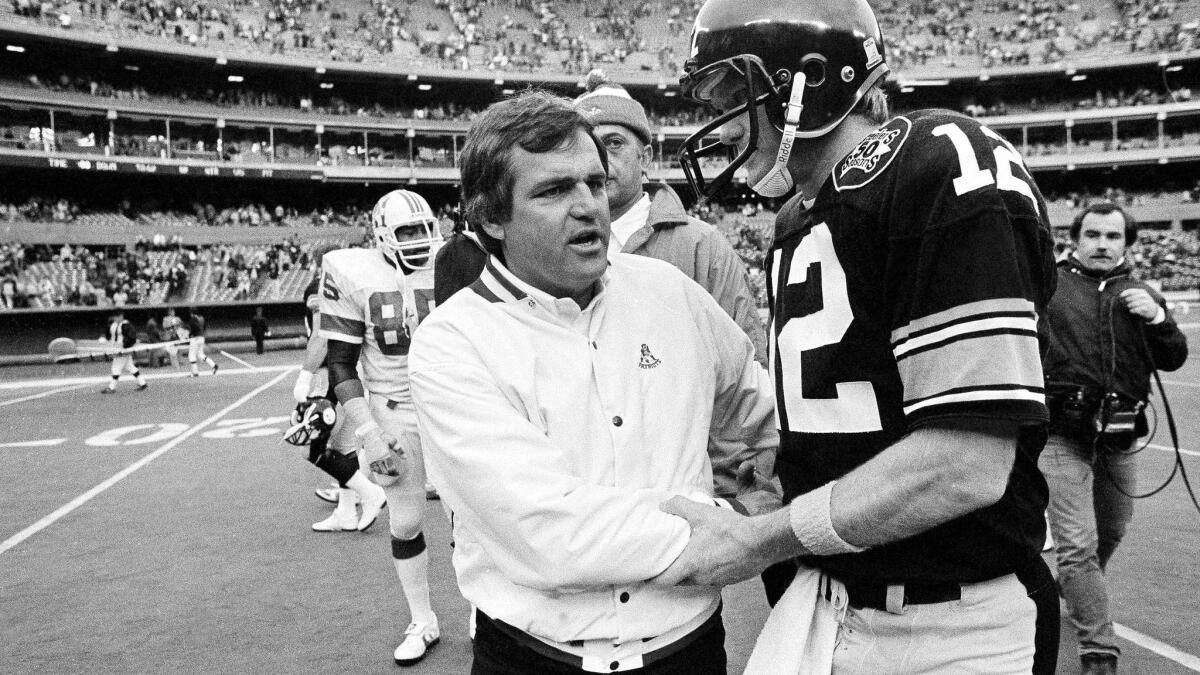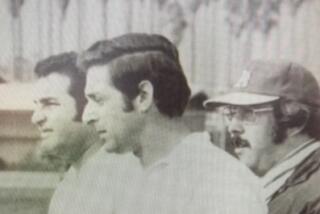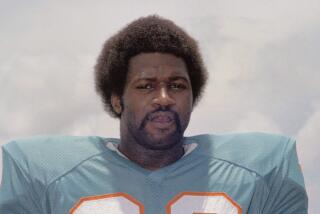Ron Meyer, who coached the ‘Pony Express’ at SMU and won an NFL game with an improvised snowplow, dies at 76

- Share via
Reporting from Austin, Texas — Ron Meyer, the football coach behind Southern Methodist University’s powerhouse “Pony Express” teams who later called for a snowplow to clear a spot so the New England Patriots could kick a winning field goal in one of the NFL’s memorable moments, has died. He was 76.
Meyer died Tuesday after collapsing with an aortic aneurysm while playing golf in the Austin suburb of Lakeway, his family said in a statement.
“It’s no accident that at every stop he coached down-trodden teams to great heights. He gave them hope. They believed in him. And he showed them the way,” Meyer’s family said.
“Devastated to hear the passing of my coach and great friend Ron Meyer. My mom and I loved Coach Meyer. He was a great man,” tweeted former NFL star Eric Dickerson, who played for Meyer at SMU from 1979 to 1981.
That was SMU’s heyday, when the Mustangs, led by running backs Dickerson and Craig James, turned a middling program into a Southwest Conference champion before it skidded toward the NCAA’s “death penalty” ruling for some of the most abusive rules violations in college football.
Meyer won 27 games in three seasons at University of Nevada, Las Vegas, before taking the job at SMU in 1976. After early struggles, the program — which had already been sanctioned by the NCAA for infractions before Meyer arrived — took off as wealthy boosters, fueled by the region’s economic boom of the late 1970s and early 1980s, got caught up in a payment scheme designed to bring in top players.
The cheating survived long after Meyer left for the NFL and eventually led the NCAA to first put the program on probation in 1985 and then shut it down in 1987. It took years to rebuild the program.
Meyer left SMU before the harshest sanctions hit, taking over the Patriots in 1982. He would spend parts of nine seasons in the NFL and his first one produced perhaps his most memorable moment.
Meyer was named AFC coach of the year in the strike-shortened 1982 season when he led the Patriots to a 5-4 record and the playoffs with a key victory over the Dolphins in a December snowstorm in New England. Before the game, the Patriots offered $10 and a free ticket to anyone who would help shovel snow out of the seats. The conditions didn’t let up, making it difficult for field crews to even clear the yard markers.
The game was 0-0 and both teams had already missed field goals when Meyer called time out late in the fourth quarter and sent a stadium worker named Mark Henderson out to clear the Miami 23-yard line for John Smith’s 33-yard attempt.
“[Meyer] said, ‘Get out there and do something.’ I knew exactly what he meant, so I jumped on the tractor,” Henderson told the Boston Globe in 2010.
With clear turf, Smith easily made the kick as Dolphins coach Don Shula furiously looked on from the opposite sideline. The final score was 3-0.
“I wanted to go out there and punch him out,” Shula said years later. “In retrospect, I should have laid down in front of the snowplow.”
The snowplow wasn’t really a snowplow. The green John Deere tractor with a brush rigged onto the front is still on display in the Patriots’ hall of fame.
Meyer spent two and a half seasons with the Patriots, then coached the Colts from 1986 to 1991 and led the team to a division title in 1987. Meyer’s career coaching record in college was 61-40-1. He was 54-50 in the NFL.
“I am sad to hear of Ron Meyer’s passing,” said Patriots Chairman and CEO Robert Kraft. “He was a colorful head coach who was very entertaining for fans during his tenure.”
Meyer was born in Westerville, Ohio, on Feb. 17, 1941, and he was a walk-on football player at Purdue. He is survived by his wife, Cindy; four children and grandchildren.
More to Read
Start your day right
Sign up for Essential California for the L.A. Times biggest news, features and recommendations in your inbox six days a week.
You may occasionally receive promotional content from the Los Angeles Times.







